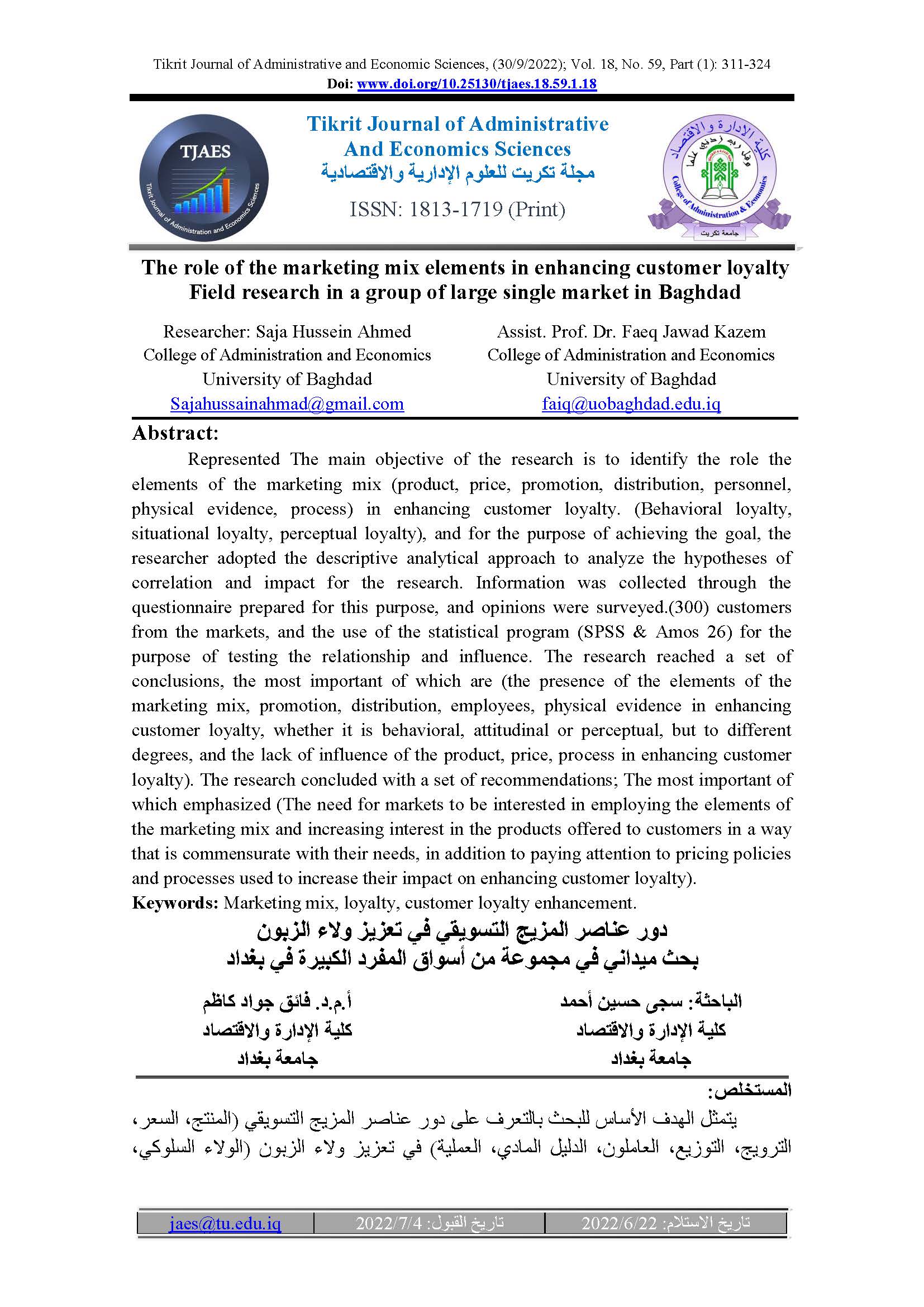The role of the marketing mix elements in enhancing customer loyaltyField research in a group of large single market in Baghdad
Main Article Content
Abstract
Represented The main objective of the research is to identify the role the elements of the marketing mix (product, price, promotion, distribution, personnel, physical evidence, process) in enhancing customer loyalty. (Behavioral loyalty, situational loyalty, perceptual loyalty), and for the purpose of achieving the goal, the researcher adopted the descriptive analytical approach to analyze the hypotheses of correlation and impact for the research. Information was collected through the questionnaire prepared for this purpose, and opinions were surveyed.(300) customers from the markets, and the use of the statistical program (SPSS & Amos 26) for the purpose of testing the relationship and influence. The research reached a set of conclusions, the most important of which are (the presence of the elements of the marketing mix, promotion, distribution, employees, physical evidence in enhancing customer loyalty, whether it is behavioral, attitudinal or perceptual, but to different degrees, and the lack of influence of the product, price, process in enhancing customer loyalty). The research concluded with a set of recommendations; The most important of which emphasized (The need for markets to be interested in employing the elements of the marketing mix and increasing interest in the products offered to customers in a way that is commensurate with their needs, in addition to paying attention to pricing policies and processes used to increase their impact on enhancing customer loyalty).
Downloads
Article Details
References
Abedi, G., Malekzadeh R., Moosazadeh, M., Abedini, E., Hasanpoor, E., (2019), Nurses’ Perspectives on the Impact of Marketing Mix Elements (7Ps) on Patients’ Tendency to Kind of Hospital, Ethiop J Health Sci.;29(2):223, doi:http:// dx.doi.org/10.4314ejhs.v29i2.9.
Akroush, M., (2011), The 7Ps Classification of the Services Marketing Mix Revisited: An Empirical Assessment of their Generalisability, Applicability and Effect on Performance - Evidence from Jordan's, Jordan Journal of Business Administration, Volume 7, No. 1.
Al-Ayed, S., (2022), The impact of e-commerce drivers on e-customer loyalty: Evidence from KSA, International Journal of Data and Network Science 6 pp. 73–80.
Ali, D., Alam, M., Bilal, H., (2021), The Influence of Service Quality, Price and Environment on Customer Loyalty in the Restaurant's Industry: The Mediating Role of Customer Satisfaction, Journal of Accounting and Finance in Emerging Economies, Volume 7: Issue 1 March.
AL-Rubaiee & AL-Nazer, (2010), Investigate the impact of relationship marketing orientation on customer loyalty, international journal of marketing studies, vol.1, (1).
Anuwichanont, Jirawat, (2010), Examining the relationship between commitment and airline loyalty and the moderating effect of uncertainty avoidance, journal of business and economics research, vol. 8, no. 9, p. 127-137.
Boonlertvanich, K., (2019), Service quality, satisfaction, trust, and loyalty: the moderating role of main-bank and wealth status, International Journal of Bank Marketing, 37(1)
Do, Q. H.& Vu, T. H. A., (2020), Understanding consumer satisfaction with railway transportation service: An application of 7Ps marketing mix, Management Science Letters 10 (2020) 1341–1350.
Islam, M. F., Hasan, M. M., (2020), The Effect of Marketing Mix (7Ps’) on Tourists’ Satisfaction: A Study on Cumilla, the cost and management, ISSN 1817-5090, VOL.-48, NUMBER-02, MARCH-APRIL.
Jenneboer, L., Herrando, C., Constantinides, E., (2022), The Impact of Chatbots on Customer Loyalty: A Systematic Literature Review, J. Theor. Appl. Electron. Commer. Res. 2022, 17, 212–229.
kandampully, j, & Zhang,T, Bilgihan, A, (2015), customar loylate: a review and future directions with a special focus on the hospitality industry, International Journal of Contemporary Hospitality Management, 27(4).
Kotler, P., & Keller, K.L., (2006), Marketing management, (12th ed.), Upper Saddle River, NJ: Pearson Prentice Hall
Madumere, (2021), Service Quality Perception and Customer Loyalty Intention to Road Transport Firms in South East, Nigeria, Department of marketing faculty of management sciences Nnamdi Azikiwe university, awkaanambra state, Nigeria.
Marušić, T., (2019), Importance of marketing mix in successful positioning of products and services on the market, Ekonomska misao I praksa, (1), 431-446.
Muhammad, B. A., Ibrahim, A., & Umar, I., (2022), Marketing Mix as Determinant of Sustainability of Small-Scale Business in Alkaleri, Bauchi State, Nigeria, Artilce, CMU Academy Journal of Management and Business Education, 1(1), 50–56.
Mustafa, D., H., (2022), The correlation between Islamic bank services, customer satisfaction, and customer loyalty: a study in Iraq, Master Thesis, Karabuk University Institute of Graduate Programs, Department of Finance and Islamic Banking Prepared as.
Pomering, A., (2017), Marketing for sustainability: Extending the conceptualisation of the marketing mix to drive value for individuals and society at large, Australasian Marketing Journal, 25 (2).
Rizal, S., Rivai, Rahmi, (2022), Merak Port Customer Loyalty, j s m, Vol.4, Issue1, jan.
Suhonen, T., Tengyall, J., (2009), Branding in the air: A study about the impact of sensory marketing, Jönköping International Business School.
Watson, G. F., Beck, J. T., Henderso, C. M., Palmatier R. W., (2015), Building, measuring, and profiting from customer loyalty, Academy of Marketing Science 2015.
Zhang, Jason Q., Dixi, Ashutosh, and Friedmann, Roberto, (2010), Customer loyalty and lifetime value: An empirical investigation of consumer-packaged goods, Journal of marketing theory and practice, vol. 18, no. 2, p. 127-139.


